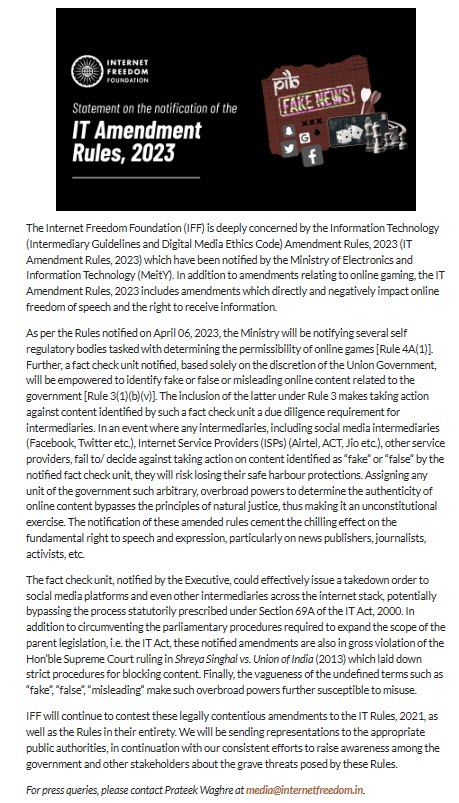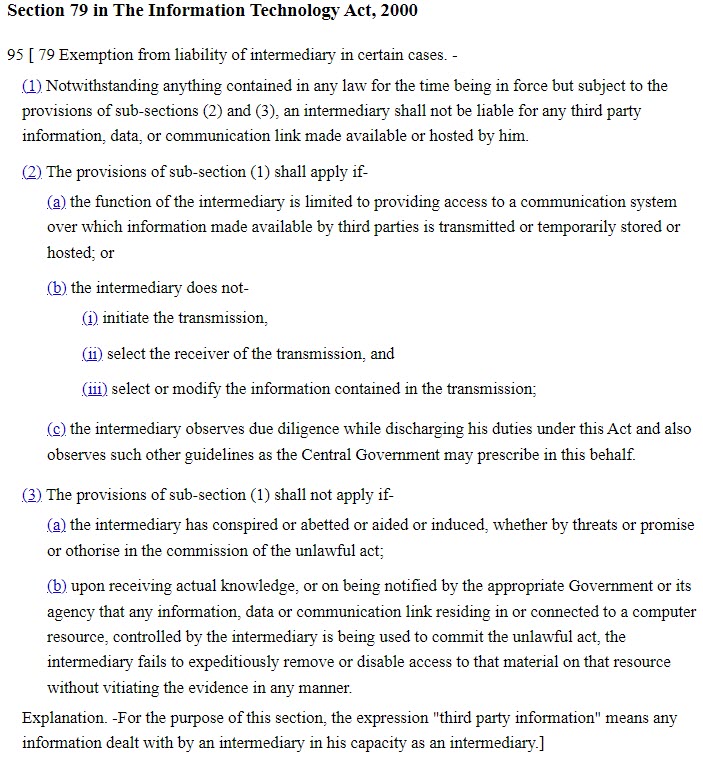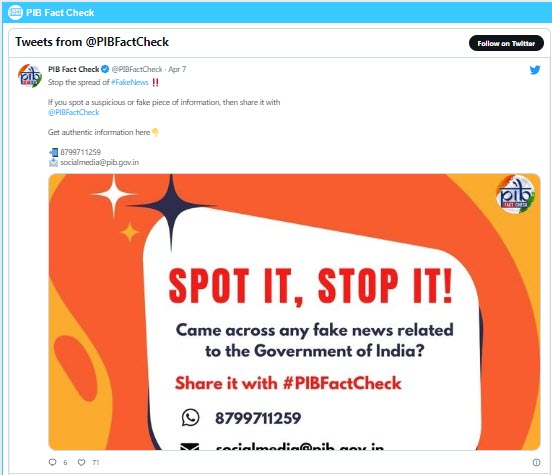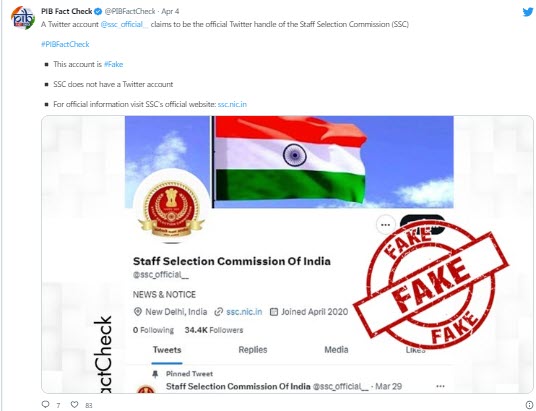[P.S. This is a continuation of the articles on the subject. Other recent articles can be found in the link given at the end of the articles]
Amidst the politicisation of the announcement by the Government about the desire to introduce a system for FactCheck in Social Media reporting, particularly against false information about the Government, we note an article in .. leaflet.in which comes to a conclusion
“in effect, a fact-check serves as a de-facto takedown order minus the processes associated with one, which already lacks adequate transparency. The ambiguity of terms such as ‘fake’, ‘false’ or ‘misleading’ coupled with the conflict of interest with having a designated unit appointed by the executive deciding what about the Union government is true or false, makes these amendments highly likely to be misused.
“Further, it is probable that to avoid liability, a range of intermediaries will mechanically comply irrespective of the quality and accuracy of the fact checks”,
“The amendment impermissibly restricts the safe harbour guaranteed to intermediaries by predicting the safe harbour on the takedown of content identified by this fact check unit as fake, false or misleading.
“The intermediary will not lose safe harbour the moment content is declared as fake, but only if the intermediary does not remove such content when ordered by the Ministry. Nevertheless, this goes against the parent act which does not include ‘fake or false or misleading’ as grounds under which online content may be ordered to be taken down.”
This article quotes the views of Mr Parteek Waghre, policy Director at IEF and makes reference to the letter written by Indian News Paper Society to the MeitY as well as the press release of the Editor’s Guild.
Mr Waghre goes on to say “Assigning any unit of the government such arbitrary, overboard powers to determine the authenticity of online content bypasses the principles of natural justice, thus making it an unconstitutional exercise. The notification of these amended rules cement (sic) the chilling effect on the fundamental right to speech and expression, particularly of news publishers, journalists, activists, etc.“
It is unfortunate that a speculative narrative is being built and is being propagated by vested media interests and we need the public to realize that these views are biased and need to be rejected.
The leaflet article states that “The factchecking unit is likely to have four members: a representative from the Union Ministry of Information and Broadcasting, one from the Union Ministry of Statistics and Programme Implementation, a media expert and a legal expert.”
As usual, the article does not quote the name of this media expert and a legal expert who had the inside information of the four member committee since the MeitY has not come up with any public information about it. If this legal and media expert is privy to the inside scoop from MeitY then he would probably be an influencer himself.
As could be expected, a petition has been filed in Mumbai High Court by a so called “Standup comedian” and in an attempt to create a TRP Judicial News, the Court has been pleased to issue a notice to the Union Government to hear the case on April 21, 2023.
Our first question is for the Mumbai High Court bench of Judges G S Patel and Neela Gokhale to file a reply and disclose the factual background that necessitated the amendment. It has asked the Government to submit its response on why the amendment should not be stayed by the Court. It appears that the probability of the Court issuing a stay is high.
We wonder why the Court should acted even before the Government actually sets up a FactCheck body and announces its constituents and the body comes up with the first 5 or 10 FactCheck reports.
Let us set aside the speculative narrative of “Chilling effect” etc and look directly at the actual amendment made.
The Intermediary Guidelines are a “Due Diligence Guideline” issued under Section 79 of ITA 2000 which the Supreme Court has upheld during the Shreya Singhal Judgement. The effect of the guideline is that an intermediary which does not follow the guideline will not get protection against liability arising out of any content published when challenged in a Court and when directed by a Court or a Competent authority is obliged to take down the designated content expeditiously. (not later than 36 hours).
Section 79 is not a “Penal Section” prescribing any penalty and the liability will arise only if the designated content can be proved to actually result in a damage which the Court upholds after a trial.
Even when a take down notice is issued, the intermediary can refuse to take down the information and wait for some body to launch judicial proceedings against it or go to the Court itself seeking an intervention of the Court for directions why the notice should be squashed.
Hence a factcheck report on a PIB website is not a “De-facto” take down notice. At best it can be the first and public notice that a particular publication is wrong. If the concerned media is responsible and committed for truth, it can conduct its own investigation and call out the fact check report itself as wrong. In many cases the truth would be some where in between and it could the headline of an article that can be misleading or there could be lack of information leading to a wrong conclusion. These can be corrected without an acrimonious Court battle.
Hence the cry of “Chilling Effect” is patently false, misleading and also mischievous. The petition indicates a malicious intention of defaming the Government of the day and preventing it from discharging it’s routine functions.
As a Citizen of the Country also protected or supposed to be protected under the Constitution and expecting the Courts to uphold my rights as a Citizen of the Country, I consider that there is a dire need for the Government to check the spread of Fake News in the media.
Recently, there was a report about a false news on Madurai Court granting relief to an accused which was perhaps in-correct. The judiciary itself has often expressed its concerns on the fake news menace. Even as late as April 14, the Supreme Court expressed concern over the proliferation of fake news and the communalisation of reportage and asked the Centre if it is “really serious” about fixing accountability on web portals and other media to check the menace. The court observed that communalisation of news gives the country a “bad name”.
Though the context was prevention of spread of Communal hatred, the argument applies to even the organized political attack on the Government in order to destabilize the democracy in the country. We cannot say what is stated against the Government is always free speech to be protected even if it is blatantly false where as any incorrect view expressed in favour of one religion or one political view opposed to the Government is an attempt to create communal hatred or an attack on Democracy.
There is a need to approach this menace with a neutral mindset and I hope the Mumbai High Court would ensure that its views will neither be politically motivated or TRP motivated.
I therefore consider that if any fake news is put out against the Government, the Government as an entity has the right to defend itself and common citizens like me consider this as a duty of the Government.
Hence the petition in the Mumbai High Court deserves to be dismissed and can be taken on a case to case basis when there is any specific instance of misuse of the provision.
What Exactly the Guideline Say?
Now re-iterating the guideline, it only suggests that practicing Due Diligence by an intermediary includes the duty namely
“the intermediary shall prominently publish on its website, mobile based application or both, as the case may be, the rules and regulations, privacy policy and user agreement in English or any language specified in the Eighth Schedule to the Constitution for access or usage of its computer resource by any person in the language of his choice and ensure compliance of the same;
And in such policy/terms of use, the intermediary shall inform that the intermediary shall make reasonable efforts to cause the user of its computer resource not to host, display, upload, modify, publish, transmit, store, update or share any information that
deceives or misleads the addressee about the origin of the message or knowingly and intentionally communicates any misinformation or information which is patently false and untrue or misleading in nature or is identified as fake or false by the fact check unit at the Press Information Bureau of the Ministry of Information and Broadcasting or other agency authorised by the Central Government for fact checking or, in respect of any business of the Central Government, by its department in which such business is transacted under the rules of business made under clause (3) of article 77 of the Constitution;
If this due diligence guidance is wrong, then the Court would be upholding that “Deceiving and misleading and misinformation of a patently false information” are part of the Free speech.
I would request the Court not to come up with such a finding.
The second part of the above paragraph which states “Or is identified as fake etc” is again a guidance for the intermediary to incorporate in its policy or terms to its users.
In other words, If I am writing an article on word press, the word press is an intermediary and in its terms it should tell me not to intentionally communicate any mis information including what has been identified as false by the Fact Check unit.
If tomorrow some body has a cause of action against me on account of the posting, then he/she could approach a Court. The Court at that time would not hold word press liable and grant it immunity under Section 79. However Court would expect cooperation from the intermediary on the identity of the content owner, whether the content was posted by the said person himself or whether it was posted by a hacker to fix the blog owner by producing log records etc. We can recall that this is a standard defence on Twitter to say “My Twitter Account was hacked and I dd not send that offensive Tweet”.
If the intermediary at that time does not cooperate in finding out the truth , it would be open to a different charge of not cooperating the Court or the law enforcement for a legitimate national security duty. The Intermediary could even be accused of facilitating the offence under Section 43(g) of ITA 2000 and charged for Civil and Criminal consequences.
An Example
I take an example of the most recent post in PIB Fact Check web page
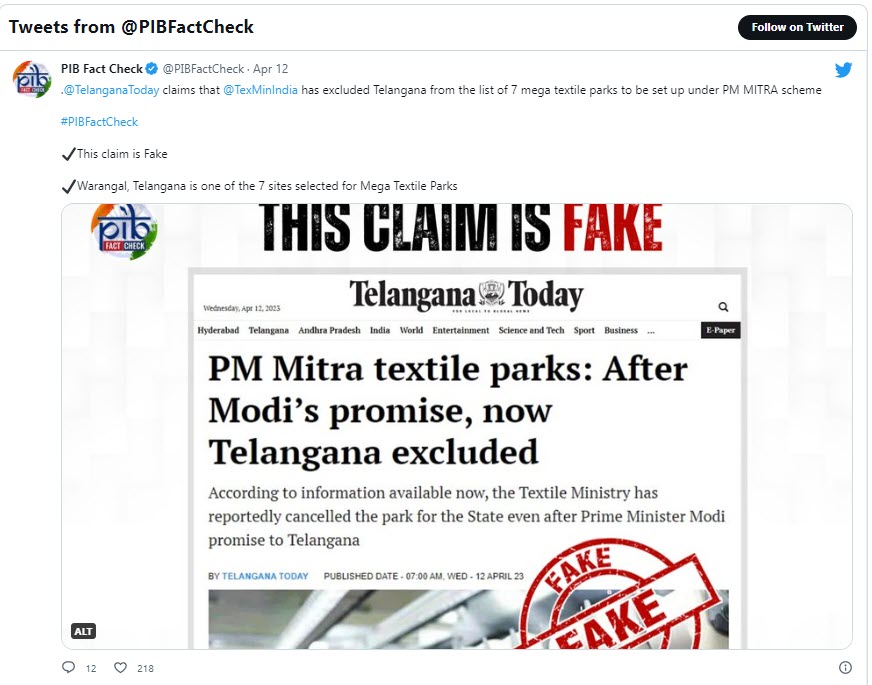
If Telengana Today had published a report that Modi’s Promise has been broken because Telengana was excluded in a Central Government project and the Textile Ministry considers that this is not true, it is the right of Mr Modi as an individual, as Prime Minister of the Country or the Ministry of Textiles or Ministry of Information and Broadcasting to stand up and question the publication. If Telengana Today had published the news erroneously then they would place a rejoinder agreeing that the information was not correct and the matter ends there.
If however, this issue is blown up and used by some politicians politically to harm the BJP, then the BJP as a party has the right to file a case against Telangana Today for not taking action to limit the damage. However the obligation to take down does not arise even when a notice is served by BJP party to the publication but only when a Court issues such an order.
I want the INS to comment why this sort of regulation is not to be imposed on the media. Just because a publication calls itself a “News Paper” , it does not give it a right of dis-information without being questioned in the Court. Since the final arbitrator is the Judicial system the Intermdiary Guidline is a small “Best Practice Guideline” and nothing more.
To make matters more clear to the professionals, let us say that ISO comes up with an amendment to its ISO 27001 standard (more particularly say on the disclosure of information from a Company regarding Privacy Notice) and introduces a new requirement. The industry cannot cry wolf and say since there are hundreds of companies already certified under ISO 27001, the guideline would cause a “Chilling Effect” on the way ISO has changed the standard etc.
It is the duty of the Government to keep on improving its suggested standards of due diligence and everything cannot be called “Chilling Effect”. If we are living in the antarctic, “Zero degree temperature” is not “Chilling”. How ever if you are living in Bangalore, even 6 degree temperature is “Chilling”.
Similarly in a world of fake news, particularly when AI created robotic publishing, deep fake etc is the norm of the day, calling out some thing as fake is not “Chilling”. It is the duty of the Government to provide such cover of truth just like we have an anti virus software to remove virus in the computer system.
Further, the guidleline only talks about a Government department issuing a Fact Check report in respect of “any business of the Central Government, by its department in which such business is transacted under the rules of business made“.
As regards information that appears elsewhere in the social media, it is open for private sector fact checking units to remain in existence and persons like Zubair of Alt News can continue their work but subject to being open for Judicial scrutiny.
Ireland Media shows the way
While on the subject, I also found the existence of “The Journal FactCheck Unit” . This is located within the news room of one of Ireleands news resources, The Journal and was established in 2016. This unit has also developed a process for not only calling out a false report but also how it can be remedied. This is similar to what Naavi had suggested way back in 2000. (Check this Article).
One of the corrections posted on the Journal FactCheck page indicates how this kind of service can function.
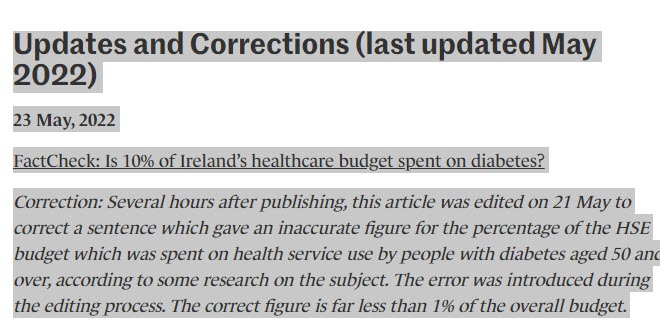
In my opinion, media should welcome the move of the Government to point out falsehood spread through planted stories. This will provide a crowd sourced and Government managed news verification service that would assist the publication to maintain its integrity.
I hope the Mumbai High Court sees it in the same way.
Naavi
Reference Articles
1.What is wrong with Internet Freedom Foundation?
2. “Deeply Disturbed” Editor’s Guild is Wrong
4.Is Editor’s Guild itself putting out a fake news?
5.There is no Right to Fake News
6.Gaming Intermediaries…Final Guidelines released
7. Mumbai High Court agrees to hear challenge to Intermediary Guidelines.. Unfortunate
8. How to respond to rogue elements on the Social Media
Also see :
Implications of fake news on human rights

